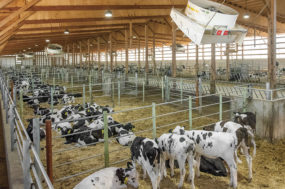The following excerpt is from the Texas Farm Bureau’s blog, Texas Agriculture Talks. Author of this post, Gene Hall, is the bureau’s public relations director. Publications Director Mike Barnett also contributes posts. Learn more at: www.texasfarmbureau.org/TxAgTalks We’ve all heard it. We’re only a few short years from climate change devastating agriculture. We used to call this global warming until the earth actually cooled a bit over the last decade. Now we call it climate change, but I won’t get into that disagreement. I’ll just concede for now that Mother Earth has warmed a bit over the last few decades.
For growing food, it doesn’t seem to matter, because there is exactly zero evidence of a climate-driven calamity for agriculture. James Taylor, senior fellow for the Heartland Institute, was a speaker at the American Farm Bureau Federation convention.
“Since 2007 we’ve seen record yields in production per acre in edible beans, cotton, alfalfa, sweet potatoes, canola, corn, hops, rice, wheat and more,” Taylor said. “This is a long-term trend, and it applies globally, too. Climate is not the only factor, but even if we accept global warming as a problem, it’s clearly not inhibiting crop production.”
Taylor says there are regional exceptions to the rule, but most of agriculture is making out quite nicely. Record yields are racked up almost every year for one crop or another.
I’ve been sitting right in the middle of one of those regional exceptions for three of the last four years. National writers have assured me that climate change is to blame for the epic Texas drought. But, people who ought to know say it also has a lot to do with those well-known weather cycles meteorologists call “El Niño” and “La Niña.”
Still, it’s worth noting that compared to some of the mega droughts of the ancient world – long before fossil fuels – this current one is just a troublesome dry spell. Drought is not a 20th and 21st century phenomenon.
Taylor does warn that climate change could bring about a real calamity in agriculture. That danger is the very real possibility that government might overreact to it and impose punitive, costly and job-killing regulations. If that happens we really will have U.S. agriculture on its knees.
It’s time to debate climate change without the hyperbole and name calling. We need to remember the ever-present danger of unintended consequences. The evidence suggests that excessive regulations have already done more harm than climate change. PD
Click here to read the full post.




